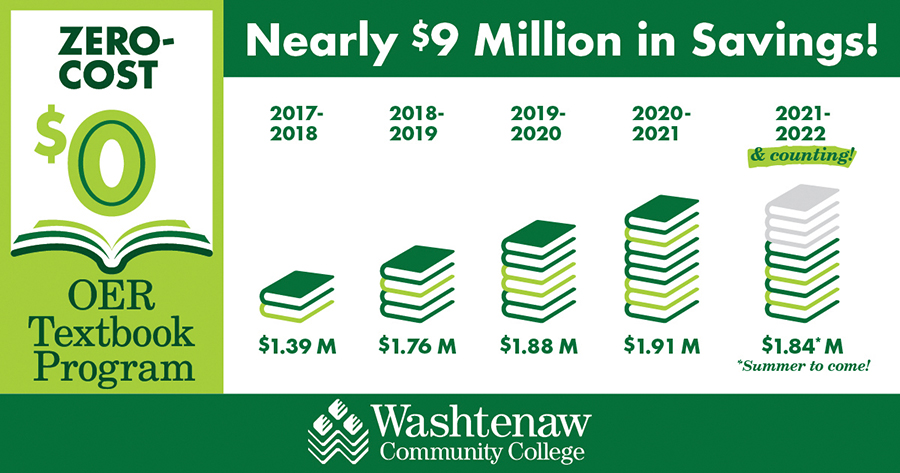
Accustomed to budgeting hundreds of dollars for textbooks each semester, Ana Andrade found a nice surprise in her inbox after registering for Fall 2020 classes. The simple message from her instructor: No need to purchase the official textbook because a free online resource is offered.
Between that microbiology class and a biology course the next semester, Andrade estimates she saved at least $200 through the free online textbook offerings.
 “I have to work to pay for my school, so for me it was a very good help at that time.
With books, tuition, transportation and other costs of college, it’s great to have
more tools to help students with all the expenses,” says Andrade (right) who plans to graduate from WCC’s Nursing program next year.
“I have to work to pay for my school, so for me it was a very good help at that time.
With books, tuition, transportation and other costs of college, it’s great to have
more tools to help students with all the expenses,” says Andrade (right) who plans to graduate from WCC’s Nursing program next year.
An international student from Brazil, Andrade first enrolled at WCC in 2018 to earn an English As a Second Language certificate, followed with an Associate of Science in Health Program Preparation.
Since Fall 2017 when the zero-cost textbook program, officially known as Open Educational Resources (OER), was introduced, Washtenaw Community College students have saved nearly $9 million in WCC’s 47 courses.
WCC now offers four entirely zero-cost textbook business certificates (with a fifth to be offered in the Fall 2022 semester), and a couple of associate degree programs with only OERs are close to completion.
The cost of purchasing textbooks can range between $300-$500 each semester, depending on the number and types of courses. In some cases, with WCC’s low tuition of $95 per credit hour for in-district students, a textbook could potentially exceed tuition fees.
Nationally, during the 2020-21 school year, the average cost of books and supplies for students at public two-year colleges was $1,460, according to College Board.
OER GROWING IN HIGHER EDUCATION
Open Educational Resources is a growing movement in higher education and is being highlighted during Open Education Week March 7-11.
A leader in this effort among community colleges in the State of Michigan, WCC’s OER program is one of three two-year institutions statewide highlighted by the Michigan OER Network, formed with the support of the Midwestern Higher Education Compact that works with institutions in the fair and equitable use of OERs for all learners.
Beyond just saving money for students, a 2017 national survey by the Association of American Colleges and Universities (AACU) outlined other positive impacts of OER, namely improved course grades, decreased course withdrawals and fewer poor or failed grades.
OERs were shown to be especially beneficial to part-time students, populations historically underserved by higher education and those receiving Pell grants, according to “The Impact of Open Educational Resources on Various Student Success Metrics,” an article about the AACU survey published in 2018 in the International Journal of Teaching and Learning in Higher Education.
RISING COSTS OF TEXTBOOKS
According to the U.S. Bureau of Labor Statistics, the costs of textbooks have increased 88% between 2006 and 2016.
 Such figures are “staggering and not sustainable,” says Molly Ledermann (right), professional librarian who leads WCC’s Bailey Library OER faculty cohorts dedicated
to the effort.
Such figures are “staggering and not sustainable,” says Molly Ledermann (right), professional librarian who leads WCC’s Bailey Library OER faculty cohorts dedicated
to the effort.
It’s no easy feat to develop a quality free online textbook to cover all the content standards for a class. Faculty members work in cohorts with library staff, developing original content, scouring open resources, mixing and matching graphics and other types of information, and navigating through the issues of attributions and copyrights.
At any given time between five and eight WCC faculty members work with library professionals to bring new zero-cost textbooks online for students.
“A lot of the time is spent adapting and adopting content to fit the course,” Ledermann says.
HELPING STUDENTS AFFORD THEIR EDUCATION
“We are committed to providing an excellent education for all students, no matter their socioeconomic background. Our growing OER efforts help tremendously with affordability, and students can be assured that the quality and content of the materials is exceptional,” says WCC President Dr. Rose B. Bellanca.
Indeed, the commitment to producing quality resources is unwavering. Business instructor Doug Waters in 2020 and 2021 was recognized with a Blackboard Exemplary Course Program Award for redesigning free business course materials.
Zero-cost textbook offerings span the spectrum of general education courses such as Math, English, Biology and History, as well as specialized programs such as Business, Criminal Justice and Psychology.
Students can now also earn entire certificates at WCC without purchasing a single textbook, and the college is close to offering a couple of zero-cost textbook associate degrees, also known as “Z Degrees”.
Business & Computer Technologies Dean Eva Samulski said additional courses and programs are near completion. “As courses get updated, or we create new ones, we start with looking at what OER would be available. This will be an ongoing initiative,” she says.
NUMEROUS BENEFITS
OERs benefit students and faculty alike. Instructors can tailor content to their curriculum and be assured that all students will have materials on the first day of classes. Students who can’t afford to purchase a book or who have to wait on financial aid payments or book shipments to arrive don’t risk falling behind in their classes.
With its many core gen ed offerings, the Division of Math, Science and Engineering Technology has greatly impacted students with free online textbook courses. From Fall 2019 to Winter 2022 semesters alone, students have saved $2.97 million across 752 sections of OER chemistry, biology, geology and math courses at WCC.
“It’s a win-win, and I’m so happy people are embracing it. When people see these staggering numbers they see how we are making a difference,” says Dr. Victor Vega, Dean of the Math, Science and Engineering Technology Division.
While the primary goal is cost savings, students point to other benefits such as the ease of access and convenience of not having to haul or store large, heavy textbooks.
 Emily Chaney (right) of Dearborn, pursuing an associate degree in Early Childhood Education, estimates she saved about $150 in a Child Care Professional course last fall.
Emily Chaney (right) of Dearborn, pursuing an associate degree in Early Childhood Education, estimates she saved about $150 in a Child Care Professional course last fall.
“It was really beneficial and relieved a lot of stress. It was easier for me to complete my readings on time because I could access the book from anywhere, including logging in on my phone when the kids were napping,” says Chaney who is a mother of three children under the age of 3 and also works full time.
Ledermann praises faculty members dedicated to helping students.
“One of the amazing things about WCC is our faculty are passionate about their students and they want to save them money. They see the choices students have to make like buying a pair of glasses or fixing a car and purchasing a textbook. Faculty have seen what it’s like if the student can’t afford or don’t have access to the textbook on the first day of class and how quickly they can fall behind,” she says.
Sue Albach, Chair of the Physical Sciences Department and a Geology lead instructor, has seen students’ grades suffer because they couldn’t afford to purchase a textbook. Developing a zero-cost online resource was the only solution she knew to help combat the issue.
“I know a lot of our students struggle financially, and science textbooks can be extremely expensive,” Albach says. “I also noticed that I was seeing large grade disparities that I couldn’t find any other reason for. When confronting students I found that many of the students struggling did not have the textbook and the main reason for not having the textbook was the cost.”
ZERO-COST TEXTBOOK BUSINESS CERTIFICATES AT WCC
Students can earn zero-cost business certificates at WCC without ever needing to purchase a textbook. Visit WCC to learn more about its Open Education Resources (OER) program, which has saved students nearly $9 million since the Fall of 2017.
- HR Essentials Certificate (three courses)
- HR Skills & Operations Certificate (six courses)
- Supply Chain Essentials Certificate (two courses)
- C++ Programming Certificate (three courses)
- Coming in Fall 2022: Management Certificate (four courses)
———
A version of this story was published in the Summer 2022 edition of Launch Magazine. See this and previous editions at wccnet.edu/launch.
Tags: Affordability, Launch Summer 2022, March 2022, OER, On The Record, Open Education Resources
